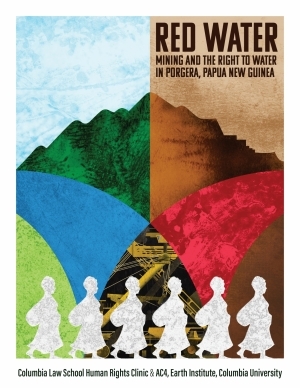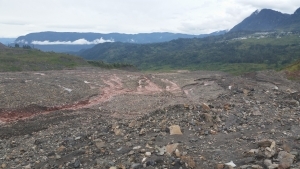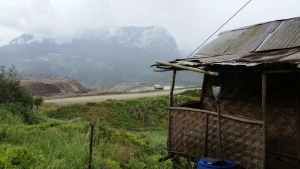Human Rights Clinic Investigation Finds Human Right to Water Unfulfilled for Indigenous Communities Living Near Industrial Gold Mine
New report, in collaboration with water scientists, calls upon mining companies and PNG government to take action to ensure consistent access to clean water
NEW YORK, MARCH 15, 2019 - Indigenous communities living near an industrial gold mine in Porgera, Papua New Guinea (PNG), lack enough clean water to meet basic needs and are exposed to concerning levels of chemicals linked to mine operations, said the Columbia Law School Human Rights Clinic in a major new report released this week. The report, “Red Water: Mining and the Right to Water in Porgera, Papua New Guinea,” is the result of a four-year investigation with water scientists. The report finds that the PNG government and the companies that own the mine are failing to meet their international human rights obligations and responsibilities.
“The residents of Porgera live with constant anxiety about whether the mine is poisoning them and their families,” explained Candy Ofime, J.D. ’17, a former Clinic student who traveled to Porgera to investigate community concerns. “They showed us the river of red tailings waste flowing from the mine into their rivers. They told us about how they have to ration rainwater, and wash in polluted rivers.”

The mine, jointly owned by mining giant Barrick Gold Corporation of Canada and Zijin Mining Group of China, dumps its tailings waste directly into the river system, leading to the contamination of major rivers with chemicals such as arsenic and lead. Residents, who use the rivers for washing, recreation, and panning for gold, told the Human Rights Clinic that they are very worried about their health and their children’s health, but they have not received enough information from the mine or the PNG government explaining any risks of contact with the water.
“The right to water is a fundamental human right. Every person has the right to enough clean water for their daily needs,” said Professor Sarah Knuckey, Director of the Human Rights Clinic. “The PNG government has the primary obligation to ensure that this right is met, and the mining companies also have a responsibility under human rights law to take necessary steps to prevent and mitigate negative impacts linked to their operations.”
Teams of students from the Clinic have traveled to Papua New Guinea since 2014 to investigate whether the communities’ right to water has been met or violated. During these visits, students and Clinic supervisors conducted interviews and focus groups with hundreds of residents of Porgera, conducted site visits across the area, and helped to take water and soil samples.
“We learned about the value of combining human rights and scientific expertise, and taking a multidisciplinary approach, to really understand human rights,” said Alison Borochoff-Porte, J.D. ’15, a former Clinic student who traveled to Porgera as part of this investigation. “Legal knowledge alone could not answer the community’s urgent questions about water safety.”
“We learned that rainwater is the main source of water for basic needs like drinking and washing, but it is often not enough,” explained Benjamin Hoffman, Deputy Director of the Human Rights Clinic. “As a result, residents must resort to water sources that are poor quality, costly, or difficult to access. Some residents even described needing to take long hikes or cross fast-flowing rivers in search of clean drinking water.”
“The right to water is not just about water quality, it is also about access to information and the right to participate in decision-making that impacts your water supply,” said Rachel LaFortune, J.D. ’18, a former Clinic student who drafted major sections of the report, and who now works with Amnesty International Canada. “Unfortunately, the mine and the PNG government are not doing enough to study the issues and inform communities about the risks of using different water sources.”

The research team, which also included environmental experts from Columbia University’s Earth Institute and Pennsylvania State University, collected water and soil samples to investigate the extent to which chemicals from the mine were in the environment.
“Some of the rivers and creeks in the area showed high concentrations of heavy metals, at times exceeding national and international drinking water guidelines,” said Joshua Fisher, Director of the Advanced Consortium on Cooperation, Conflict, and Complexity (AC4) at the Earth Institute, and one of the lead investigators. “Luckily, residents of Porgera do not generally drink from these rivers, but they do frequently wash, pan for gold, or play in this water, raising significant health concerns that need to be better studied by the mining companies and the PNG government.”
The study concludes that in order to meet its human rights law obligations, the PNG government should conduct a full audit of the environmental and social impacts of the mine, and work with the mining companies to progressively improve water infrastructure in Porgera and ensure emergency access to clean water during periods of low rainfall. The report further calls on the mining companies to work with communities to develop a human right to water policy, improve assessments of the mine’s impact on water resources and risks to human health, and provide communities in Porgera with information about water quality risks in a clear and accessible manner.
“Following years of consultations and discussion, we provide constructive and concrete recommendations to the PNG government and the mining companies about how to advance the human right to water in Porgera,” said Lara Wallis, LL.M. ’19, a Clinic student who worked on finalizing the report. “It is essential that all decisions regarding water in Porgera are conducted through meaningful dialogue with the residents themselves.”
Throughout the 2018 fall semester, the Human Rights Clinic engaged with representatives from the mine to discuss the study’s findings and recommendations.

“It has been incredibly meaningful to contribute to efforts to advance the recommendations, which are the result of years of investigation,” said Tessa Baizer, J.D. ’20, a current Clinic student. “Engagement with company representatives has been productive, and our hope is that these conversations support the implementation of the recommendations and help ensure that the concerns of the communities receive the attention they deserve.”
This study is part of many years of ongoing investigations of human rights violations in Porgera related to the mine’s activities and personnel. The Clinic previously investigated sexual assault by the mine’s staff against indigenous women, and released a report in 2015, Righting Wrongs?, investigating a faulty grievance mechanism created by the company.
###
The report is available at: https://web.law.columbia.edu/system/files/private_file/red-water-report-...
A fact-sheet is available at: https://web.law.columbia.edu/system/files/private_file/fact-sheet-red-wa...
Red Water was the joint effort of over 20 students, fellows, and faculty, in collaboration with scientists from the Advanced Consortium on Cooperation, Conflict, and Complexity (AC4) at the Earth Institute, and Pennsylvania State University. Columbia Law School Human Rights Clinic students who worked on the report were Alison Borochoff-Porte, J.D. ’15; Stephanie Persson, J.D. ’15; Holly Stubbs, J.D. ’15; Genevieve Taylor, LL.M. ’15; Whitney Hood, J.D. ’16; Gulika Reddy, LL.M. ’16; Lizzie O’Shea, LL.M. ’16; Candy Ofime, J.D. ’17; Su Anne Lee, LL.M. ’17; Doreen Ivy Bentum, J.D. ’18; Rachel LaFortune, J.D. ’18; Oyinkan Muraina, J.D. ’19; Kamilah Moore, J.D. ’19; Nia Morgan, J.D. ’19; Lara Wallis, LL.M. ’19; Laura O’Brien, LL.M. ’19; and Tessa Baizer, J.D. ’20.
The Columbia Law School Human Rights Clinic works to advance human rights around the world, and to train the next generation of strategic advocates for social justice. The Clinic works in partnership with civil society organizations and communities to carry out human rights investigations, legal and policy analysis, litigation, report-writing, and advocacy.
The Advanced Consortium on Cooperation, Conflict and Complexity (AC4) at Columbia University’s Earth Institute works to bring sustainable solutions to the issues of violent conflict, peace, and sustainable resource management. The Earth Institute, founded in 1995, leverages the expertise of its research centers, scientists, postdoctoral fellows, and staff at Columbia University to generate solutions for sustainable development. This unique institute brings together the intellectual, practical and theoretical resources needed to address some of the world’s most difficult problems including environmental sustainability, climate change, and poverty.
